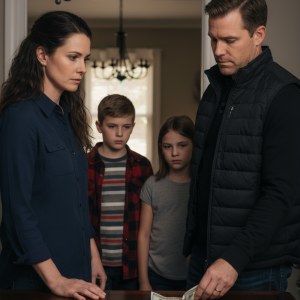I’m Sarah, twenty‑four, and six months ago I was the basement dweller in my parents’ suburban split‑level, juggling two dead‑end jobs just to keep gas in my rusty hatchback. To Mom and Dad—Linda and Robert—I was the family let‑down. My sister Emma, twenty‑six, sparkled in every way they prized: perfect career, perfect fiancé, perfect smile.
Emma’s downtown loft? Co‑signed by our parents. Her new hybrid SUV? Their signatures on the loan. Even her upcoming wedding, an event planner’s dream, was bankrolled by the nest egg they once promised would fund everyone’s retirement. I, meanwhile, was lectured on “bootstraps” when I asked for help with community‑college tuition.
Then came a drizzly Tuesday in March. On my lunch break I grabbed a coffee, my usual scratch‑off, and a lone lottery ticket marked with family birthdays—habit, not hope. Saturday night, midway through folding the week’s laundry, I remembered the ticket, checked the numbers on my spider‑webbed phone screen… and nearly fainted. Six for six. Jackpot: $3 million.
I kept my lips sealed. Spent days devouring articles on lump sums versus annuities, called three different attorneys, booked a discreet appointment with a financial adviser. After tax, I’d pocket about $1.8 million—more than enough to build a life that didn’t start in someone else’s basement.
Weeks passed. At dinner one night, Emma narrowed her eyes across the table. “You’re awfully chipper lately,” she said, spear‑pointing me with her fork. “Suspiciously chipper.”
Dad chuckled. “Sarah doesn’t do chipper.” I’d heard enough. Confidence from a secret windfall can feel like wings. “I came into some money,” I said, casual as salt. Cutlery froze mid‑air.
“How much money?” Mom’s voice sliced the silence. “Enough to start over,” I replied. Emma leaned in, scenting blood in the water. “Define enough.” I gave the number. Three million.
The explosion was immediate. Mom lectured about family loyalty; Dad demanded “his share for keeping a roof over my head.” Emma, ever pragmatic, called dibs on half for her dream home. “You didn’t earn it,” she said. “It’s luck—you should share.”
Dad laid down an ultimatum: fork over half to Emma or leave by morning. Their greed was so loud it felt like static in my ears—and they had no clue the real ticket was already being processed. I just needed to protect myself until the check cleared.
That night, I printed a near‑perfect counterfeit ticket spoofing an unrelated draw. At breakfast I played the part of the tortured soul, announced I couldn’t bear to part with half, and accepted their order to move out. I “forgot” my wallet on the counter—fake ticket inside.
Within minutes I heard the shredder whirring. Mom’s triumphant shout echoed: “The numbers don’t match! She lied!” I stepped back inside to retrieve my “ruined” wallet. Faces crimson with fury, they called me pathetic, delusional, irresponsible. I left anyway—because the lies were theirs, not mine.
By noon, I’d checked into a hotel, emailed my attorney, and confirmed my claim was underway. Two weeks later the funds hit my new account. First purchase: a cozy townhouse bathed in morning light, deed paid in cash.
Cue poetic justice: I ran into Emma and her fiancé David outside a real‑estate office, their noses pressed to the very listing I’d just closed on as an investment property. Their jaws nearly unhinged when I shared the address—yes, that dream house was mine, too.
The phone onslaught began—blocked. Voicemails dripping guilt—archived. Texts proclaiming I was ruining the family—screenshotted for posterity. Freedom tastes like cappuccinos sipped on your own patio while birds argue in the trees.
A month later Mom and Emma stormed my porch demanding reconciliation on their terms. I invited them in, pressed play on my carefully recorded clips—their own voices calling me wasteful, threatening eviction, insisting Emma “deserved” my money. Their apologies withered the moment truth echoed back at them.
Could I forgive? Maybe, someday. But love without respect is counterfeit—just like the ticket they shredded in their greed. I escorted them out, closed the door, and felt the load slide off my shoulders like an old coat.
Now I’m enrolled in business administration, driving a sensible BMW, and dating Marcus, a high‑school history teacher who thinks my terrible lasagna is “endearing.” He knows nothing about the jackpot—only that I laugh easier these days.
Emma’s engagement imploded; she mailed me a tear‑stained letter blaming “family drama.” I filed it with unopened birthday cards from my parents. Some bridges need to burn so you can see the horizon.
People say money can’t buy happiness. True. But it can buy distance from those who weaponize love. It can fund therapy, tuition, and a pantry stocked with name‑brand cereal. Mostly, it purchased the priceless lesson that my worth was never tied to their approval.
I’m Sarah, twenty‑four, and for the first time ever I wake up exactly where I choose to be—living proof that sometimes the jackpot isn’t the cash, but the clean slate it buys. And that, friends, is richer than any lottery payout.





